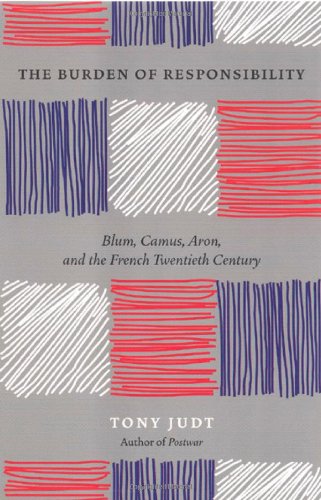
The Burden of Responsibility
Blum, Camus, Aron, and the French Twentieth Century
کتاب های مرتبط
- اطلاعات
- نقد و بررسی
- دیدگاه کاربران
نقد و بررسی

November 30, 1998
New York University European studies professor Judt (Past Imperfect: French Intellectuals 1944-1956) fashioned this book from three lectures he gave at the University of Chicago that presented an overview of some of the more complex political currents of modern France. He starts with a much vilified figure of the 1930s who is now largely ignored--the first Jewish (and Socialist) French premier, Leon Blum. Judt argues--not entirely convincingly--that Blum was more of a politician and less of an esthete than is generally thought. After Blum, Judt turns to a nemesis of the 1968 generation, the French conservative Raymond Aron. While Judt's discussion of individuals' changing fortunes provides an interesting view of the French intelligentsia, he overstates matters when he claims that Aron was universally accepted in France at the time of his death. In a somewhat less original contribution, Judt discusses the familiar figure of Albert Camus, apparently because he serves as a chronological link between the other two. Naturally, the brushstrokes are very broad in these brief studies, and many of Judt's assertions, particularly those that speculate about motive, are open to argument (Does anyone else think that Camus' journals are "funny"?). Since full-length studies of Blum and Aron are still awaiting translation from the French, these opinionated lectures serve as a useful incentive to read further on their subjects.

November 1, 1998
In these essays, originally lectures at the University of Chicago, Judt (European studies, NYU) accuses French intellectuals of "moral irresponsibility"--as he did in his earlier Past Imperfect: French Intellectuals, 1944-1956 (LJ 10/1/92). Once again, he expresses his conviction that French intellectuals failed to lead their country culturally and politically from the pre-World War II years through the mid-1970s. Here, however, Judt presents the antidote to his earlier book, examining the lives of Leon Blum, Albert Camus, and Raymond Aron. What set them apart from other intellectuals was the way they looked beyond the political pressures of the day to take moral stands on issues that included anti-Semitism, decolonization, ideological and political quarrels, communism, and socialism. These three figures stood courageously by their views, guided by moral integrity and personal responsibility, and eventually gained some redemption in the eyes of the public. Highly recommended for large public and academic libraries.--Ali Houissa, Cornell Univ., Ithaca, NY

























دیدگاه کاربران